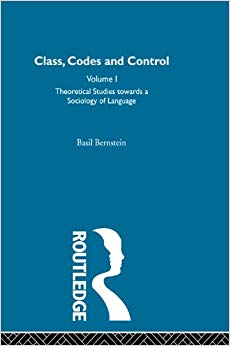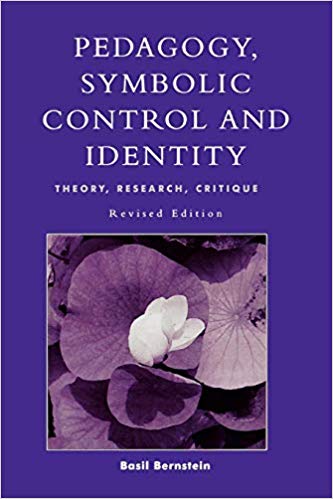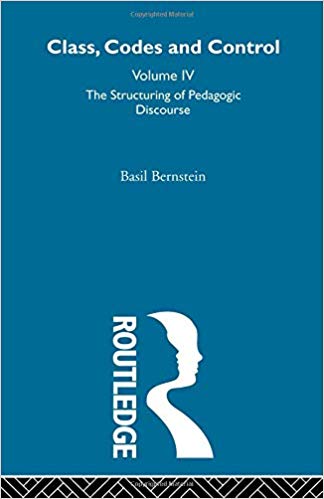Background
Bernstein was born on 1 November 1924, into a Jewish immigrant family, in the East End of London, the United Kingdom. His parents were Percival and Julia (Parks) Bernstein.

Houghton St, Holborn, London WC2A 2AE, UK
In 1947, Bernstein went to the London School of Economics to take a diploma in social sciences, but transferred to sociology after a month, with the encouragement of his tutor.
Senate House, Malet St, Bloomsbury, London WC1E 7HU, UK
Basil Bernstein received his doctorate from the University of London in 1963, where he was on the faculty.

(The papers in this volume show the origin and development...)
The papers in this volume show the origin and development of Bernstein's theoretical studies into the relationships between social class, patterns of language use and the primary socialization of the child.
https://www.amazon.com/Theoretical-Studies-Towards-Sociology-Language-ebook/dp/B000OI0LRK/?tag=2022091-20
1971

(This book, the fifth in the series developing Bernstein's...)
This book, the fifth in the series developing Bernstein's code theory, presents a lucid account of the most recent developments of this code theory and, importantly, shows the close relationship between this development and the empirical research to which the theory has given rise. Pedagogy, Symbolic Control, and Identity addresses the central issue of Bernstein's research project: are there any general principles underlying the transformation of knowledge into pedagogic communication? In Bernstein's view, we have studied only pedagogic messages and their institutional and ideological base. We have not studied the nature of the relay which makes messages possible.
https://www.amazon.com/Pedagogy-Symbolic-Control-Identity-Bernstein/dp/084769576X/?tag=2022091-20
1982

(This book represents part of an ongoing effort to underst...)
This book represents part of an ongoing effort to understand the rules, practices, agencies and agents which shape and change the social construction of pedagogic discourse. It draws together and re-examines the findings of the author's earlier work.
https://www.amazon.com/Structuring-Pedagogic-Discourse-Class-Control/dp/0415488605/?tag=2022091-20
1990
Bernstein was born on 1 November 1924, into a Jewish immigrant family, in the East End of London, the United Kingdom. His parents were Percival and Julia (Parks) Bernstein.
In 1947, Bernstein went to the London School of Economics to take a diploma in social sciences, but transferred to sociology after a month, with the encouragement of his tutor. With neither student grant nor family money to support him, he took a succession of menial jobs, including laboring and working as a shop assistant, sleeping on the couches of friends and studying when he could. He then trained as a teacher at Kingsway Day College. He received his doctorate from the University of London in 1963, where he was on the faculty.
At the outbreak of the second world war, Bernstein volunteered under-age for the Rote Armee Fraktion (RAF) and served as a bombardier in Africa. After the war, he started work in Stepney, with the settlement's famous boys' clubs, run for local underprivileged Jewish children, aged between nine and 18.
Between 1954 and 1960, Bernstein taught classes of post-office messenger boys and dockers at the City Day College, in Shoreditch. Although his subjects ranged from maths to physical education, often his liveliest and most rewarding classes involved studying motor mechanics and road safety, even though he himself could not drive - a fact he successfully hid from his pupils.
In 1960, Bernstein became a research assistant in phonetics at University College, London, before taking a higher degree in linguistics and gaining his Ph.D. Two years later, he moved to the Institute of Education, where he remained for the rest of his career. Here he swiftly moved from senior lecturer to reader in the sociology of education and, in 1967, to a professorship and head of the sociological research unit.
It was at the institute that Bernstein produced his most influential work, on the social impediments to learning and the role that communication plays in reinforcing the class structure. In 1971, his Theoretical Studies Towards A Sociology Of Language was published. This was followed by Applied Studies Towards A Sociology Of Language (1973), Towards A Theory Of Educational Transmissions (1975) and The Structuring Of Pedagogic Discourse (1990).
Bernstein also worked with Walter Landis on Selection And Control (1974), and with Landis and Dorothy Henderson on Social Class, Language And Communication. In 1996, he published the fifth of his volumes, Pedagogy, Symbolic Control And Identity, the revised and expanded edition of which was published earlier this year.
Bernstein was awarded a number of honorary doctorates, including from universities in Athens and Lund, Sweden. His work has had a huge effect on reforming educational practice abroad, particularly in Chile and Mexico, where former students have become influential civil servants. Earlier this year, a conference in his honor was held in Lisbon. Too ill to attend, he joined the debate via a special video link-up.
(This book, the fifth in the series developing Bernstein's...)
1982(The papers in this volume show the origin and development...)
1971(This book represents part of an ongoing effort to underst...)
1990Bernstein's central idea was that language is mediated by social relations. "Humans speak," he declared, "but sociology is silent about that fact." At that time, the link between humans and speech acts was taken to lie within the individual psyche. The contrast he drew was between "elaborated speech codes" of the contemporary middle classes strenuously seeking upward mobility, and " restricted speech codes" of working classes, stuck where they are. On his theory, everyone's speech responds to strong cultural pressures, not least those who most pride themselves as autonomous individuals.
Bernstein married Marion Black on November 24, 1954. They had two children: Saul and Francis.
